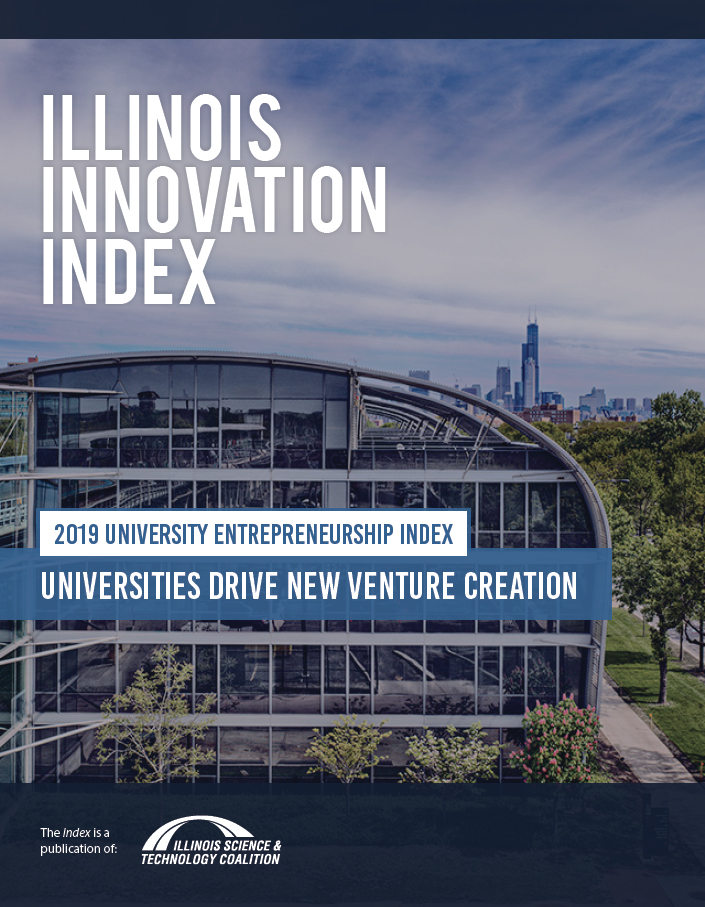University Entrepreneurship
2019 University Entrepreneurship Index
Universities Drive New Venture Creation
Introduction
Illinois’ universities are engines of innovation and economic growth. Each year they bolster the state’s talent pipeline with 25,000 new STEM graduates and drive discovery by conducting $2.4 billion in research & development activity. Over the past decade, Illinois’ universities have also increased efforts to ensure that innovations made possible by university research are able to reach the commercial marketplace through technology transfer and the creation of startup companies. By doing so, universities create economic growth through innovation and job creation.
This 2019 University Entrepreneurship issue marks 10 years of university-supported startup data tracked by the Illinois Innovation Index. Spurred by an increase in resources and support—as well as better tracking of startups by universities—we’ve seen explosive growth in entrepreneurial activity over the past decade. This year’s issue continues that trend, with a record number of startups founded, and funding raised, over the past five years. This issue is also the first to include an analysis of job creation, further highlighting the direct economic impact of university-supported entrepreneurship.
KEY FINDINGS
- Over the past five academic years (2013-2014 through 2017-2018), students and faculty at Illinois’ universities have founded 978 startups, the largest volume of startup activity for any five-year period tracked by the Index. This level of startup activity represents an increase of 153 percent over the previous five-year period, when 386 startups were founded.
- Nearly two-thirds (65.5 percent) of startups founded over the past five years remain active, while 32.8 percent are inactive, and 1.6 percent have been acquired.
- Tech transfer startups—those backed by university IP—are significantly more likely to remain active at the five-year mark (78.1 percent), compared with non-tech transfer startups (45.9 percent).
- Among active startups founded over the past five years, 80 percent are located in Illinois (513 startups), up from 70.1 percent over the previous five-year period. The consistently high share of startups located in Illinois is a credit to the pipeline that has developed between universities and the state’s larger network of support resources.
- By industry, startup activity is led by biomedical & biotechnology (16 percent); software & IT (15 percent); healthcare & social services (10 percent); and retail, wholesale goods, ecommerce (10 percent).
- An estimated 3,000 jobs have been created by startups founded over the past five years. Of these jobs, 2,600 remain active and 1,700 are located in Illinois.
- Startups founded over the past five years have raised $1.24 billion in funding. The first time funding has surpassed $1 billion for startups founded over a five-year period.
- Nearly three out of four startups that receive funding are located in Illinois. However, nearly two-thirds (62.5 percent, 12 startups) of startups that have raised more than $10 million are located outside the state.
- Funding is dominated by startups in biomedical & biotechnology, which have raised $583 million. Startups in retail, wholesale goods, ecommerce ($131 million) and transportation ($130 million) have also raised more than $100 million in funding.
- Illinois ranks 13th nationally in SBIR/STTR funding awarded to all companies, receiving $52.9 million in 2017. SBIR/STTR funding has increased just 1.7 percent annually in Illinois since 2013, compared with 4 percent annual growth nationally. University-supported startups founded over the past five years have raised $41.6 million in SBIR/STTR awards.
- The number of startups utilizing the NSF I-Corps program has increased, with 173 startups participating over the last five years. Startups participating in I-Corps are more than three-times more likely to receive SBIR/STTR funding.
- Thanks to university efforts to increase diversity and inclusion in entrepreneurship, an estimated 33 percent of startups founded over the past five years have at least one female founder, nearly twice the national average of 17 percent.
- Foreign-born founders are critical to new venture creation. Of startups founded over the past five years, an estimated 37 percent have at least one foreign-born founder. This finding illustrates the need for a startup visa in the US, which would allow these founders to stay in the country to build their startups.
- Commercialization activity has seen mixed growth in recent years. In 2017, Illinois universities disclosed 748 inventions, were awarded 250 patents, and created 173 license and options agreements. Illinois also ranks third nationally in license income, bringing in $1.37 billion since 2013.
Archive
2022 - R&D Index
Illinois' R&D Landscape and How COVID-19 Impacted Innovation
2020- R&D Index
Illinois' Capacity for Innovation & Economic Growth
2019 - R&D Index
Illinois' R&D Landscape & Path Forward
2018 - R&D Index
R&D growth struggles to match peer states, but machinery, finance & insurance among bright spots.
2017 - R&D Index
New analysis finds slow R&D growth in Illinois, despite key academic and business areas of strength.
2015 - R&D Index
Analysis finds alignment between federal funding for academic science and technology R&D, research quality, and output in Illinois.
2014 - R&D Index
R&D expenditures by Illinois universities hold steady
2013 - R&D Index
Capital and infrastructure for innovation

